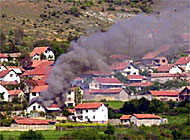
Swiss language system offers insights – not model – for Macedonia

The conditional peace accord agreed on Wednesday between the Macedonian government and ethnic Albanian rebels, which will lead to the dual use of the Albanian language in certain parts of the country, appears to parallel the Swiss federal system. But analysts agree that Switzerland cannot become a model for Macedonia.
Julien Hottinger, professor of political science at the University of Fribourg, says it is dangerous to conclude that one country’s model can work just as well elsewhere in the world.
“Switzerland has a very rigid linguistic policy which is defined according to geographical areas, but the case of Macedonia does not throw up such a model,” Hottinger said in an interview with swissinfo.
But Hottinger agrees that Switzerland’s history of compromise offers hope to peace brokers in Macedonia seeking a way out of war and towards a permanent settlement.
“Let’s not forget that a form of compromise usually starts with a basic deal and then gradually builds itself up,” Hottinger argues.
Swiss case took time
“The Swiss case did not build up overnight: it was a process which took over 150 years.”
The issue of compromise, Hottinger suggests, is just as crucial in the case of Macedonia.
“The main thing is for both sides to find a compromise that will bring peace and – at least initially – satisfaction to all communities in Macedonia.”
The needs of different communities must be taken into account, Hottinger says, when drawing up a peace settlement.
As the Swiss example proves, Hottinger affirms, the acceptance of different official languages can help countries like Macedonia to avoid war and focus on the development of a stable nation.
“I really believe there is a need to recognise different communities, accept their demands and thus create a situation where dialogue imposes itself and violence should stop.”
Cultural identity
But Hottinger is also quick to highlight an important cultural and geographical difference between Switzerland and Macedonia.
“The major difference is that the languages spoken in Switzerland are, with the exception of Romantsch, also spoken in neighbouring countries. This means that you have linguistic communities who don’t feel they are isolated.”
The situation in Albania, analysts suggest, is very different, because the Albanians make up only a small minority of the total population.
Under the terms of the peace agreement, Albanian will become an official language only in areas where at least 20 per cent of the local population is of Albanian extraction.
“It’s true that Albanians in Macedonia have neighbouring countries that speak the same language, but they do not share a cultural identity built on common ground,” Hottinger said.
swissinfo with agencies

In compliance with the JTI standards
More: SWI swissinfo.ch certified by the Journalism Trust Initiative





























You can find an overview of ongoing debates with our journalists here . Please join us!
If you want to start a conversation about a topic raised in this article or want to report factual errors, email us at english@swissinfo.ch.